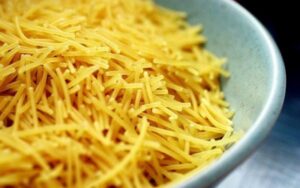
Swiss company Nestlé has launched the first production line at its new vermicelli factory in Smolyhiv (Torchynska settlement community, Lutsk district, Volyn region), which is the result of a CHF40 million ($50 million at the current exchange rate) investment announced 30 months ago, according to a press release issued by the company on Monday. according to a company press release on Monday.
“The production capacity of the first line will enable the company to produce 5,000 tons of vermicelli by the end of 2025, with a planned increase in production with the opening of additional lines in the next two years,” the release said.
Nestlé notes that the Smolyhiv factory is the fourth factory opened in the company’s 30 years of operation in Ukraine.
“With the opening of the new factory, the company has created a European hub for food production in Ukraine in Volyn, combining the new factory in Smolyhiv with the one already operating in neighboring Torchyn,” the statement said.
According to the statement, the company is expanding its vermicelli production to meet growing demand in both Europe and Ukraine under the Maggi and Mivina brands. The new factory is an export-oriented enterprise: 75% of its products will be supplied to EU markets under the Maggi brand, which will increase foreign currency inflows to Ukraine. At the same time, 75% of the raw materials for production come from local suppliers in Ukraine, with wheat and sunflower oil being the key ingredients.
“The factory’s advantageous geographical location in western Ukraine creates ideal conditions for Nestlé to produce in Ukraine for both the local market and for export,” said Alessandro Zanelli, CEO of Nestlé in Ukraine and Southeast Europe, in a press release.
He added that the factory is a modern, digital, and fully automated production facility.
Ivan Rudnytskyi, head of the Volyn Regional State Administration, recalled that a factory producing ketchups and sauces under the Torchyn brand and a Nestlé distribution center are already operating in the region, and the launch of the new factory has created more than 300 new jobs, and that this number will increase in the near future to more than 1,500 people in the newly created production hub in Volyn.
Nestlé is one of the world’s largest food and beverage companies, operating in 187 countries. It offers a wide range of products and services for families and pets.
It has over 2,000 brands. Nestlé began operations in Ukraine in 1994 with the opening of a representative office, acquired a controlling stake in ZAT Lvivska Kondyterska Fabryka Svitloch in 1998, and has owned 100% of the company since 2018.
In May 2003, Nestlé Ukraine LLC was established in Kyiv, and at the end of that year, Nestlé became the owner of 100% of the shares of Volynholding.
In 2010, Nestlé SA acquired Technocom LLC in Kharkiv, a manufacturer of instant products under the Mivina brand. In 2012, Nestlé Business Service (NBS Europe) was established in Lviv, which is one of seven Nestlé service centers in the world and provides support services to Nestlé divisions in more than 40 countries.
Nestlé’s business in Ukraine includes the following areas: coffee and beverages, confectionery, culinary products (cold sauces, seasonings, soups, instant products), baby and special nutrition, ready-to-eat breakfasts, and pet food.
At the end of last year, Dzanelli reported that Nestlé in Ukraine had increased production by 7-8% in 2024 and expects 10% growth in 2025.
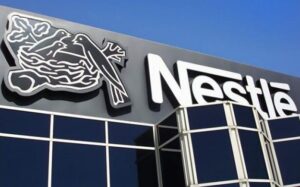
In 2024, Nestlé in Ukraine invested more than UAH 900 million in three of its factories, which allowed the company to increase production efficiency and increase exports by 76%, according to a release.
“In 2024, the company invested more than UAH 900 million in the development of its three factories in Ukraine. The investments were focused on employee safety solutions, automation and digitalization of production processes and production lines, employee training and development, improvement of working conditions and infrastructure of production facilities, and technological solutions to reduce the carbon footprint,” the statement said.
The company noted that last year, thanks to investments, while maintaining supplies to 28 countries, it was able to significantly increase its exports: by 76% in volume and 128% in hryvnia equivalent.
“In 2024, the FMCG market in Ukraine grew by slightly less than 10%, including due to volumes. Nestlé also plays a role in this growth. We have similar growth with a focus on volume growth, which can be estimated at 7-8%, which is a consequence of our strategy. We have completely redesigned our portfolio, following consumer trends, and adjusted our promotional activities in line with the market situation,” emphasized Alessandro Zanelli, CEO of Nestlé in Ukraine and South-Eastern Europe.
The company cited the launch of a new line of Street Food sauces under the Torchyn brand as an example of its adaptability to consumer needs in times of war, when there is a lack of outdoor activities. This product category was created with an emphasis on the development of street food dishes, the company said in a statement.
In addition, Nestlé in Ukraine continues to produce products to help Ukrainians affected by the war. Since the beginning of the full-scale war, as of the end of 2024, the company has donated more than UAH 1.3 billion in aid, including food donated through charitable foundations for civilians and the military, as well as cash contributions to support, among others, the UNBROKEN and Superhumans rehabilitation centers.
Nestlé is one of the world’s largest food and beverage companies with operations in 187 countries. It offers a wide range of products and services for families and pets. It has more than 2000 trademarks.
Nestlé started its operations in Ukraine in 1994 with the opening of a representative office, acquired a controlling stake in CJSC Lviv Confectionery Factory Svitoch in 1998, and since 2018 has owned 100% of the company’s shares.
In 2010, Nestlé SA acquired Technocom LLC in Kharkiv, a manufacturer of fast food products under the Mivina brand. In 2012, Nestlé Business Service (NBS Europe) was established in Lviv, which is one of seven Nestlé service centers in the world and provides support services to Nestlé divisions in more than 40 countries.
Nestlé’s business in Ukraine is represented by the following areas: coffee and beverages, confectionery, cooking (cold sauces, condiments, soups, convenience foods), baby and specialty foods, breakfast cereals, and pet food.
In 2025, the company plans to open a new factory in Smolyhiv, Volyn region, which is currently in the final stages of construction. It is expected that 80% of the products manufactured at the new factory will be exported to the EU.
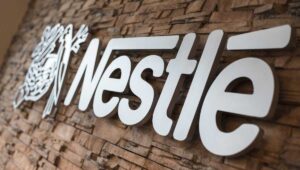
In 2025, Nestlé intends to invest UAH 8 billion in commercial activities in Ukraine, in particular, in the promotion of goods in retail chains, as well as UAH 1.5 billion in the modernization of factories to improve products, said Alessandro Zanelli, CEO of the company in Ukraine and South-Eastern Europe.
“The consumer goods category will continue to grow until 2025. But in 2025, everyone will feel a lot of pressure on margins. You can’t put everything on consumers alone, because inflation is already high in the country. We will have to work hard to create the right narrative about our business model,” he said at the ‘Global Outlook Enduring Change!’ organized by the European Business Association.
Zanelli advised entrepreneurs to identify the driving forces of their business, understand what creates consumer power and work to improve efficiency.
Speaking about Nestlé in Ukraine, he noted that the company intends to increase its presence in Ukraine in 2025, for which it plans to invest about UAH 8 billion in commercial activities, in particular, in the promotion of consumer goods in retail chains. In addition, about UAH 1.5 billion will be invested in improving the condition of the company’s plants.
The CEO of Nestlé in Ukraine added that the company has been delaying the launch of a new plant in Volyn region for six months due to constant air hazards, lack of builders and labor, but intends to launch in March 2025.
Nestlé’s business in Ukraine is represented by the following areas: coffee and beverages, confectionery, cooking (cold sauces, condiments, soups, convenience foods), baby and specialty foods, breakfast cereals, and pet food.

Nestlé in Ukraine increased its production by 10% in 2024 and intends to repeat this growth next year, said Alessandro Zanelli, CEO of the company in Ukraine and Southeast Europe.
“Ukraine’s FMCG grew by just under 10% this year and demonstrated a strong focus on volume growth. This is a very clear sign of the resilience of the Ukrainian macroeconomy, which is hardly at war. Overall, the country’s GDP is quite resilient. We do not see the local currency, the hryvnia, collapsing. It is a steady controlled devaluation. At the same time, inflation is also relatively stable and under control,” he said at the NV conference ‘Ukraine and the World Ahead 2025’.
Zanelli noted that Nestle’s growth in Ukraine was at a similar level – just under 10% with an emphasis on volume growth, which can be estimated at 7-8%. The company’s CEO explained such indicators during the war as the result of the implemented strategy aimed at maintaining sustainability. The company’s team joined forces to protect its people, which allowed Nestle’s factories in Ukraine to continue operating even in Kharkiv. Being under constant shelling, this company also found an opportunity to increase productivity, the CEO explained. He noted that Nestle’s strategy in Ukraine also focuses on adaptability at all levels: from responding to changing consumer trends and adjusting the product portfolio and their locations to changing the timing of promotional activities and transforming communications to bring more hope and make products relevant to consumers.
Zanelli assessed the results of Nestle’s work in Ukraine as satisfactory and expressed confidence that in 2025, even taking into account possible difficulties, production growth will be similar – at least 10% per year.
The company’s CEO predicts that in the second quarter of 2025, Ukrainians and the FMGG segment will face rising inflation, which will lead to a significant rise in food prices. In addition, the shortage of skilled labor will increase. He also sees the cost of electricity as a challenge for the coming year. Zanelli said that the probability of the war ending, which the whole society is waiting for, is a possible “white swan”.
“In general, we remain optimistic, as I said, and expect about 10% growth,” Zanelli stated.
He also explained the postponement of the launch of the new plant in Volyn region from December 2024 to January 2025 by various elements of disruption, including the increase in air raids and the availability of people. At the same time, the top manager assured that the launch will take place, for which the company, along with recruiting specialists living in the region of the plant’s construction, is relocating staff from Kharkiv.
Zanelli emphasized that the location of the new plant next to another plant (Torchyn, Volyn region – IF-U) is the intention to create a food production center near the border with the European Union. The products produced by the new plant will be exported by 80%. In the domestic market, the company will increase its presence and market share through supplies from other companies.
“Usually, to make a business attractive, we first improve its efficiency and then immediately reinvest back into efficiency to grow and increase market share. It is extremely important for us to have an additional plant in Ukraine (…) We as Nestle understand that the war will end. It is too easy to come and invest on the first day after the war ends. For us, the moment of investment has come now, so we are planning for the future,” summarized the CEO of Nestlé in Ukraine.
Nestlé started its operations in Ukraine in 1994 with the opening of a representative office, acquired a controlling stake in Lviv Confectionery Factory Svitoch in 1998, and has owned 100% of the company’s shares since 2018. Nestlé’s business in Ukraine is represented by the following areas: coffee and beverages, confectionery, cooking (cold sauces, condiments, soups, fast food), baby and specialty food, breakfast cereals, and pet food.
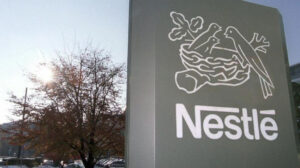
Nestlé in Ukraine intends to commission a new factory in Smolyhiv (Volyn region) in the fourth quarter of 2024, in the construction of which it has invested $45 million, according to a release from the company’s press office in Ukraine.
“The new factory will become part of a culinary production hub and will produce products, including those for export to the EU (…). The opening of the factory is scheduled for the fourth quarter of this year – on the 30th anniversary of Nestlé’s work in Ukraine,” the release said.
According to the report, in the first half of 2024, the company completed a number of construction works, installed some equipment, and continued to expand its green electricity generation capacity. In particular, a 500 kW solar power plant was installed, and another 700 kW is planned to be added in the near future, after which solar power plants will be able to provide 18% of the factory’s electricity needs.
In addition, the company is in the process of recruiting employees for the new factory: the company has already hired more than 100 people and opened the same number of vacancies. Prior to the opening of the factory, 300 jobs were created, and their number will continue to increase. The company continues to invest in its existing factories in Ukraine and provide Ukrainians with food. In the first half of 2024, the company maintained sales growth in Ukraine, focusing on adapting to the growing needs of consumers for basic food products. Nestlé in Ukraine has reformatted its product portfolio and adjusted production plans of its factories to meet demand.
At the same time, Nestlé Ukraine increased exports to European countries by 30% in 2023. With the opening of the new factory, it is planned to increase exports to the EU countries and thus support the process of European integration of the Ukrainian food industry.
The spokesperson reminded that Nestlé in Ukraine has invested more than $100 million in the Ukrainian economy over the past 10 years.
“The company will continue to invest in its production sites in Ukraine and support 5500 Ukrainian employees,” Nestlé Ukraine assured.
Nestlé started its operations in Ukraine in 1994 with the opening of a representative office, in 1998 it acquired a controlling stake in CJSC Lviv Confectionery Factory Svitoch, and since 2018 it has owned 100% of the company’s shares. In May 2003, Nestlé Ukraine LLC was founded in Kyiv, and at the end of that year, Nestlé became the owner of 100% of Volyn Holding.
Nestlé’s business in Ukraine is represented by the following areas: coffee and beverages, confectionery, cooking (cold sauces, condiments, soups, fast food), baby and specialty food, breakfast cereals, and pet food.
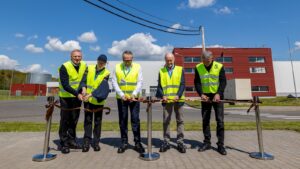
Switzerland’s Nestlé, the world’s largest producer of food and soft drinks, has launched the announced construction of a plant to manufacture pasta and other food products in the Smolyhiv village, Torchyna district, Volyn region. Earlier the company invested CHF40 million (nearly $45 million) in the project, business.rayon reported.
Alessandro Zanelli, general director of Nestlé in Ukraine and Southeast Europe, expressed confidence Wednesday at a ceremony marking the start of construction that the plant in Torchin will become a European regional hub for the culinary category.
“I’ve seen Ukrainian cities that were destroyed after all kinds of attacks and how they were rebuilt within a year. The Ukrainians are working successfully to rebuild the infrastructure. Of course, we are calculating the possible risks, but we are confident that we are doing the right thing. Ukraine is worth investing in,” said Marco Sattembri, executive vice president of Nestlé and chief executive of the European zone.
It is specified that at the first stage of work the enterprise will create 300-400 workplaces. Specialists from Kharkov, where there is already a factory producing instant noodles “Mivina”, and local staff are involved in the work at the plant.
Nestle is one of the world’s largest food producers, headquartered in Vevey, Switzerland. The company has 376 factories in 84 countries and produces chocolate and confectionery products, ready-made breakfasts, pet food, baby and medical food, coffee, mineral water, etc. Its portfolio includes more than 2 thousand brands, including Nestle, Nescafe, KitKat, Gerber and Maggi.
Nestle in Ukraine produces coffee and beverages, confectionary, culinary products (cold sauces, seasonings, soups, instant food), baby and special food, ready-made breakfasts and pet food. The most famous Ukrainian brands of the company are Svitoch, Torchin and Miwina.
As reported, in December 2022, Nestle announced its decision to open the production of “Mivina” in Volyn.